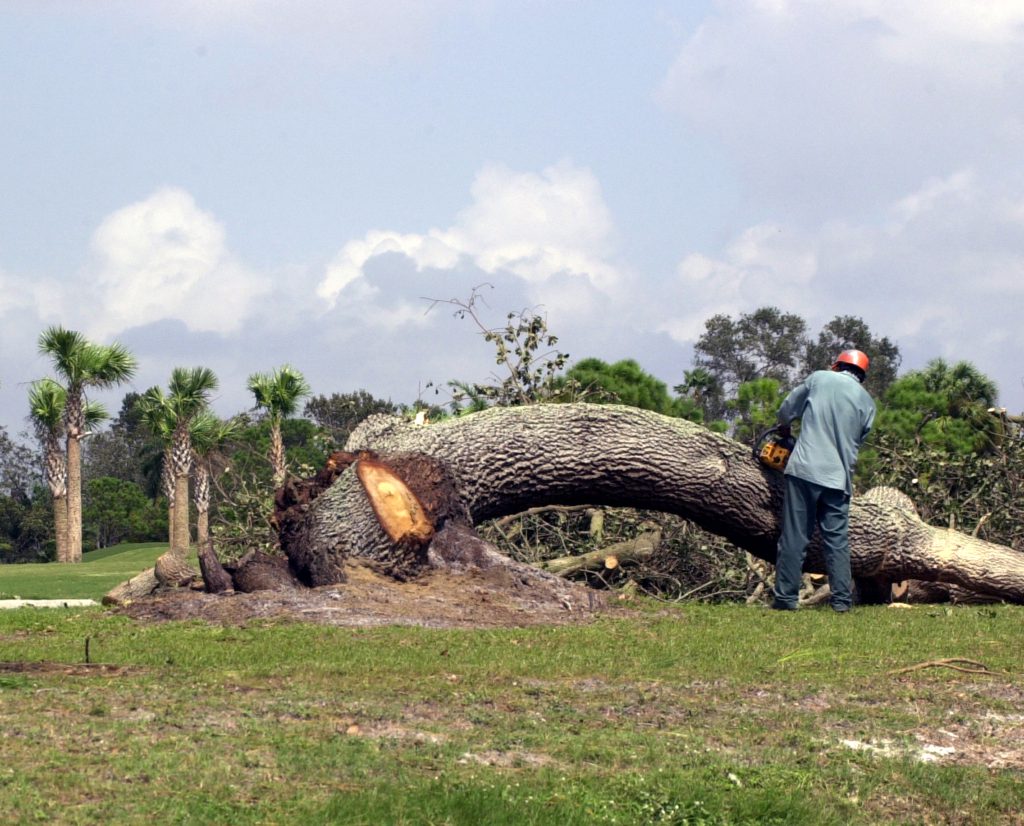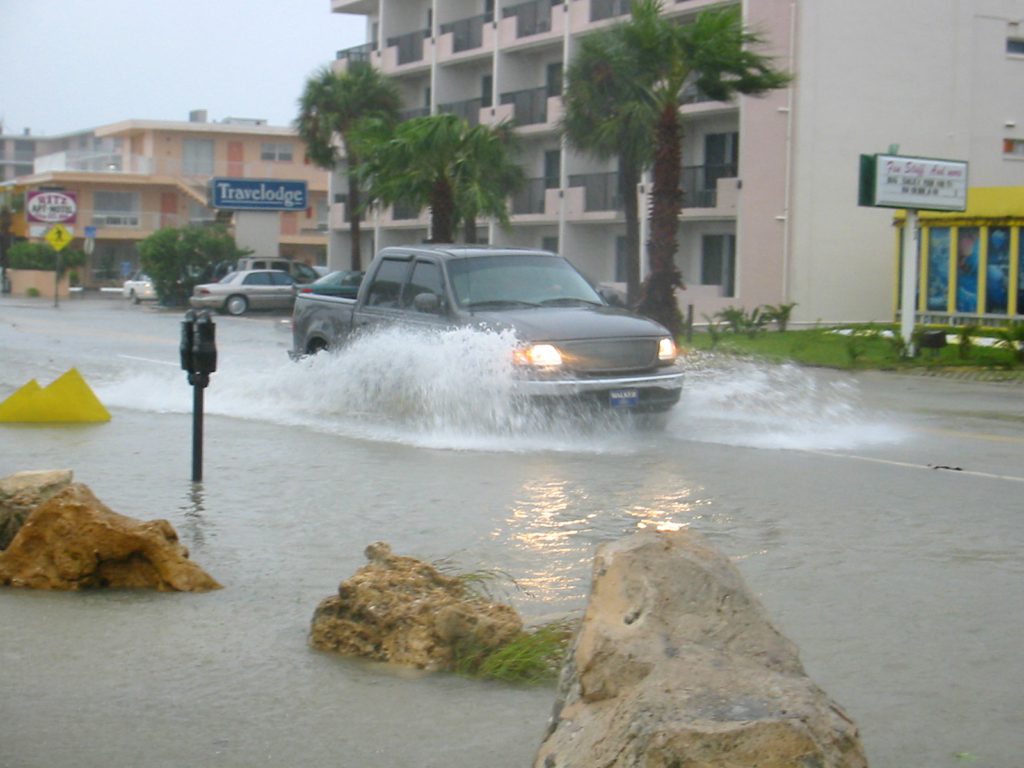During and After a Storm
As a storm approaches and gains strength, there will come a point in time when it is no longer safe to evacuate and everyone will need to shelter in place. Once winds reach 40 to 50 mph conditions, responders will not be able to respond to emergencies. If you choose to shelter in your home instead of evacuating, you must be prepared to react to certain dangers. Here are some things you can do to keep you and your family safe during and after a storm.
During the Storm
If floodwater starts coming into your home:
Do not go outside and wade through the water. Floodwater and storm surge can move very quickly, and live power lines could be hidden in the water. Stay inside. Stand or sit off the floor, like on a bed or table. If the water becomes too high, get on your roof if necessary.
If there is a tornado or high sustained winds:
Get to the lowest level of your home and take shelter in an interior room without windows, like a closet or hallway. Lie on the floor under a table or other sturdy object if you cannot make it to a safe room. Curl up and cover your head with a mattress or another item.
If you are outside, seek shelter in a sturdy building. If you cannot get to a safe building, find a low area like a ditch. Lay down and protect your head. Do not take shelter under a highway bridge or overpass.
If the power goes out for up to six hours:
Move perishable foods from the refrigerator into an ice-filled cooler. Put a thermometer in the cooler to make sure it stays below 40 degrees. Meats and other perishable foods above 40 degrees will spoil after two hours.
If the power stays out for up to two days:
Food in the freezer can be stored safely for two days if you keep the freezer door shut. Once the storm passes, cook any unspoiled food outside and consider sharing with your neighbors. Beyond two days, you will need nonperishable food. Learn more about food safety.
If the water supply is affected:
Monitor the news for boil water advisories, which tell you if there is a possibility of contamination. Under a boil water advisory, you can disinfect the water using these methods:
- Boiling: Bring a pot of water to a rolling boil for one minute to ensure bacteria, viruses or parasites are gone.
- Bleaching: Add 1/8 teaspoon of unscented bleach per gallon of water and let stand for 30 minutes. Use bleach that contains 5.25 percent sodium hypochlorite. Bleaching is less effective than boiling, but will work if there is no way to boil water.
If there is a sewer outage:
Do not flush your toilet if a sewage outage is announced. Flushing could cause sewage to backup into your home. Use a portable toilet, like one used on a boat or camper, or set one up by using one of the following methods:
- Line a five-gallon bucket with a heavy-duty trash bag. Make sure the bucket has a tight lid. Use household bleach as a disinfectant.
- Turn off your outside water supply. Empty the water from the toilet bowl, and line the empty bowl with a heavy-duty trash bag.
Do not use cat litter. It cannot be flushed after the sewer system is running. When you learn that the sewer is operating again, dump the contents of your emergency toilet into your household toilet and flush. Thoroughly sanitize your emergency toilet with bleach before storing or disposing. Bleach can be used as a disinfectant for cleaning by mixing nine parts of water to one part bleach.
If phone, cable and cell service is down:
- Use a battery- or crank-powered radio. Radio broadcasts are usually the last communication source to go down, and AM stations can broadcast longer than FM. Severe weather alerts are also transmitted through the NOAA Weather Alert Radio.
- Texting messaging may work when other services do not. If your phone’s digital clock works, then you can send and receive texts. Social media and mobile apps may be working as well.
- Keep your phone and other devices charged. Use your back-up battery charger and solar-battery chargers. Use a vehicle to to charge your devices. If you have power and your neighbors don’t, invite them recharge their devices.
After the Storm
In the days following a hurricane, crews will be busy clearing roads, responding to emergency calls and assessing damage. You must rely on what you have stored for food, medications and entertainment.
- Only call 911 in the case of a police, medical or fire emergency.
- If you need information, call the County Information Center at 727-464-4333.
- Shelter in place. Do not attempt to travel. If you must go outside of your home, be mindful of dangers like downed power lines or contaminated floodwater.
- Assume that there is a boil water notice in place until you hear differently.
- Take photos of your property for insurance. Take immediate steps to reduce flood damage.
- Check on your neighbors. Share food, and take care of each other.
- If you want to volunteer, call the County Information Center to get connected with agencies and areas in need.
- Set up a carbon monoxide detector before running a generator. Follow all manufacturer guidelines.
- Do not put anything on the stove. Items left on the stove will cause a fire when the power comes back on.
Debris Cleanup
Each municipality and unincorporated area of the county partners with different companies for waste management. Residents need to check with their city or their hauler on how to dispose of yard debris, trash and large items.
- Normal daily schedules and processes will likely be different after a storm. Residents must be patient as officials address the most urgent needs first.
- You can contact your municipality, wait for instruction from your city or the county, or watch the news.
- If you live on a private road, you need to plan ahead for your own debris disposal.
- Contractors are responsible for debris removal. That is included in their fees. If you hire a contractor to cut down a tree or do repairs, then be sure they are licensed and fulfill their responsibilities.
Chainsaw Safety

Use caution when operating a chainsaw to clear downed trees and branches.
Before starting the saw:
- Wear proper safety gear, including eye and hearing protection, heavy work gloves and work boots.
- Check controls, chain tension, and all bolts and handles to ensure they are functioning properly.
- Fuel your saw at least 10 feet from sources of ignition.
- Clear debris that may interfere with cutting.
While running the saw:
- Keep hands on the handles, and maintain secure footing.
- Do not cut directly overhead or overreach with the saw.
- Be prepared for kickback.
Driving Safely

Even after major roadways are clear and it is safe to drive, streets may seem unfamiliar and driving conditions could be dangerous.
- If traffic lights are not working, treat an intersection as a four-way stop sign.
- Do not drive through standing water. You will not know the depth of the water, nor will you know the condition of the road under the water.
- Match your speed to road conditions. Cars can quickly become uncontrollable when driving on damaged, debris-choked roads.
- Visibility may be limited. Increased traffic on congested roadways and large trucks can obstruct your line of sight.
- Traffic patterns may be shifted in work zones. Obey posted work zone speed limits at all times. Be aware of equipment and workers.
- Obey all “road closed” signs. Just because you cannot see road damage does not mean it is safe.
- Not all damaged or destroyed road signs have been replaced. Be prepared to yield or stop unexpectedly.
- Drive with lights on and slow down.
Mosquitoes and Hurricanes
Following a hurricane or tropical storm, the wet conditions can result in increased mosquito populations that last from two weeks to up to two months. While Pinellas County Mosquito Control implements their post-storm action plan, residents should also take steps to prepare.
Pinellas County recommends residents include items in their hurricane preparedness kit that focus on protecting themselves from mosquito bites after a storm.
These recommended items include:
- Insect repellent with a CDC-recommended active ingredient (DEET, Picaridin, IR3535 or Oil of Lemon Eucalyptus)
- Loose, light-colored, long-sleeved clothing
- Screen repair kit
- Screen doorway curtains (to prevent mosquitoes from entering open doorways)
- Spatial repellent devices
- Extra heartworm preventative medicine for dogs and cats.
- Bti, a concentrated soil bacterium that targets mosquito larvae
- Can be used to treat standing water that may be present in debris, pools in disrepair, or other areas on the resident’s property that water cannot be dumped out.
- Usually found at hardware stores in a granular bit or donut-shaped dunk.
Watch for Price Gouging
In a declared state of emergency, it is illegal for a business to sell necessary goods or services at increased prices. If you believe a business or individual is price gouging, call Pinellas County Consumer Protection at 727-464-6200. You can also report it to the Florida Attorney General’s Office at 866-966-7226 or through their website portal. If you do not have phone or internet service, then document the activities of the business of individual and report it as soon as you can.